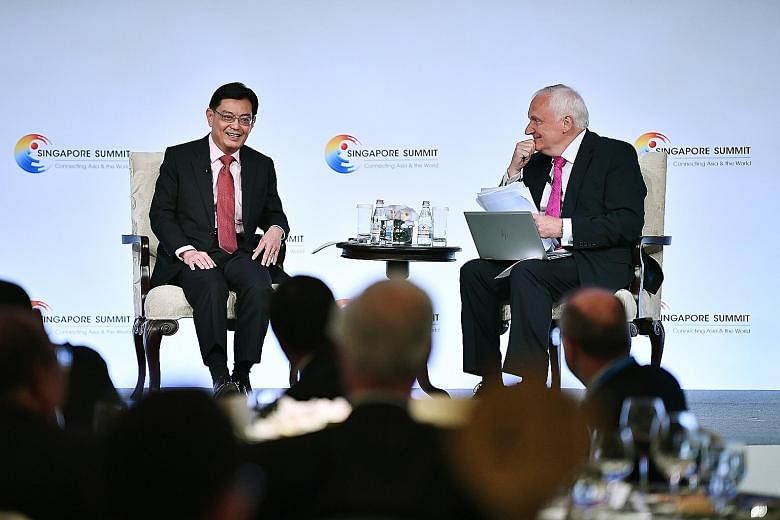It is inevitable that companies restructure when an economy grows. But business leaders could do much to ensure their workers are not left behind, Deputy Prime Minister Heng Swee Keat said yesterday.
In particular, they could retrain workers to fill new roles, he said, replying to a question on striking the right balance between social equality and economic growth.
Mr Heng, who was speaking at the annual Singapore Summit, acknowledged that every business needs to transform, innovate and look for new markets.
"But what is it that companies can do to bring the workers along?" he asked. He shared how Singapore worked to ensure economic restructuring, job redesign and worker retraining came together so that workers shared in the growth.
During a 30-minute dialogue following his keynote address at the Shangri-La Hotel, DPM Heng was quizzed by business and thought leaders on several subjects, including governance and leadership, how to encourage social entrepreneurship, and strategies that economies can adopt in the face of challenges such as an ageing population.
Mr Jacob A. Frenkel, chairman of JP Morgan Chase International, also asked DPM Heng for his views on how to bring about the free flow of capital across economies, in the face of rising protectionism.
"We are all passengers on the big airplane, where the two co-pilots do not get along," Mr Frenkel said, alluding to tensions between the United States and China.
DPM Heng said he would adopt an approach a small economy - like Singapore's - would take, which is that if the "big tankers" are not moving, then hopefully the "smaller speed boats" can move a little faster.
He outlined several things Sin-gapore has been doing, such as working with like-minded countries by signing free trade agreements and bilateral investment treaties with them.
For emerging economies to grow, infrastructure is also needed, DPM Heng said, and here, Singapore's Infrastructure Asia initiative helps to marry demand and supply with proper structuring, financing and risk management of these projects.
On a question about challenges facing ageing societies, he said the way people think about their life cycles has to change.
At present, many think of life in terms of getting an education, entering the workforce, followed by retirement, he added.
But with people living much longer, "that cycle is no longer the valid paradigm", Mr Heng said.
"We have to think about multiple cycles of working and learning... We have to think about lifelong learning, where we learn to learn, unlearn and relearn new things, to take on new roles and new responsibilities."
He noted that in countries like Japan, seniors stay active at work or remain plugged into social networks. "It is not just about making money. It is also about having that whole social network," he said. "You can interact with people, you can continue to have friends, you can continue to have a life."

